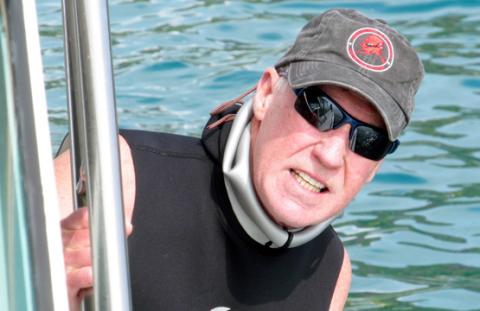

University of Alaska, Fairbanks
I seldom have a dull project in a dull location. The frequent use of scuba diving and two-person submarines are also highlights of my job.
Education
- B.S., Biology, John Brown University
- M.S., Biology, University of Alaska - Fairbanks
- Ph.D., Fisheries, University of Alaska - Fairbanks
Salary
$125,000+
Contact
What is your current job and what does it entail?
I am a research professor at the Institute of Marine Science of the University of Alaska, Fairbanks. I am also the diving safety officer for the statewide University of Alaska. The research position entails initiating, coordinating and working on research projects in the area of marine biology and fisheries throughout Alaska and the Pacific Northwest. Most of my research has focused on environmental impact assessment issues, such as effects from commercial trawling; offshore dredging; offshore placer gold mining; feasibility, construction and maintenance of industrial port sites; the 1989 Exxon Valdez oil spill; and mercury and radionuclide contamination. For 12 years I examined the effects of the Exxon Valdez oil spill on invertebrates and fishes in the nearshore waters of Prince William Sound to determine what is limiting the recovery of sea otters and other vertebrates impacted by the oil spill. I have also examined the effects of an offshore gold mining operation on red king crab, the welfare of pink salmon from a hatchery adjacent to an oil terminal, the effects of a pulp mill on marine life, and the effects of possible leaking radioactivity in the marine food web. As diving officer, I oversee all scientific diving operations conducted by students, staff and faculty.
What was the key factor in your career decision?
While growing up on the coast of Maine, I spent much of my time in and on the water. It was this exposure, coupled with an inspirational high school science teacher, that planted the seed for me to pursue a career in marine biology.
What do like most about your career?
The field activities associated with sampling, making observations and collecting data interest me the most. I seldom have a dull project in a dull location. The frequent use of scuba diving and two-person submarines are also highlights.
What do you like least about your career?
The tedious compilation of frequent reports.
What do you do to relax?
I like to bike, hike, run, dive, play golf, hunt and fish.
Who are your heroes/heroines?
There are three people who were most inspirational to me in pursuing my career: my high school science teacher, my undergraduate advisor, and my M.S. graduate advisor. All were articulate and enthusiastic in revealing some of the wonders of God's creation and challenging me to discover more.
What advice would you give a student who expressed an interest in pursuing a career in your field?
Take all of the math, science and computer courses you can. Get some hands-on experience by doing projects for science fairs or by attending summer camps that focus on science. Visit aquaria and museums. Develop photography/videography, good swimming and scuba diving skills.
Are career opportunities in your field increasing or decreasing and why?
I believe that job opportunities in the field of marine biology and other marine sciences are expanding, primarily because of the increasing awareness of worldwide pollution, the potential of the oceans to help alleviate increasing world food shortages, and the role oceans play in global climate. In addition, the aquatic environment provides the setting for a multitude of uses, such as boating, fishing, farming, mining and transportation.
What will you be doing 10 years from today?
I will probably be partially retired. However, so long as I remain healthy and my appetite stays strong for trying to unlock some of the secrets of the ocean world, I will continue to pursue my love for marine biology. I would like to work temporarily in other oceans of the world, such as in Antarctica, South America and the tropics.
